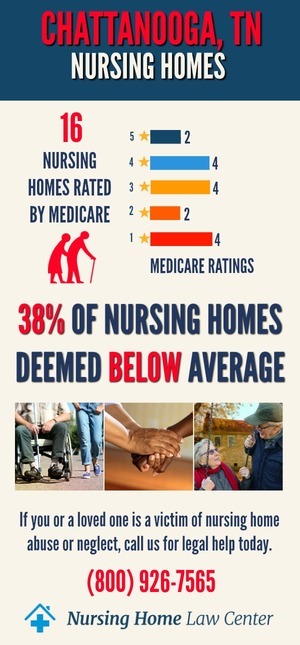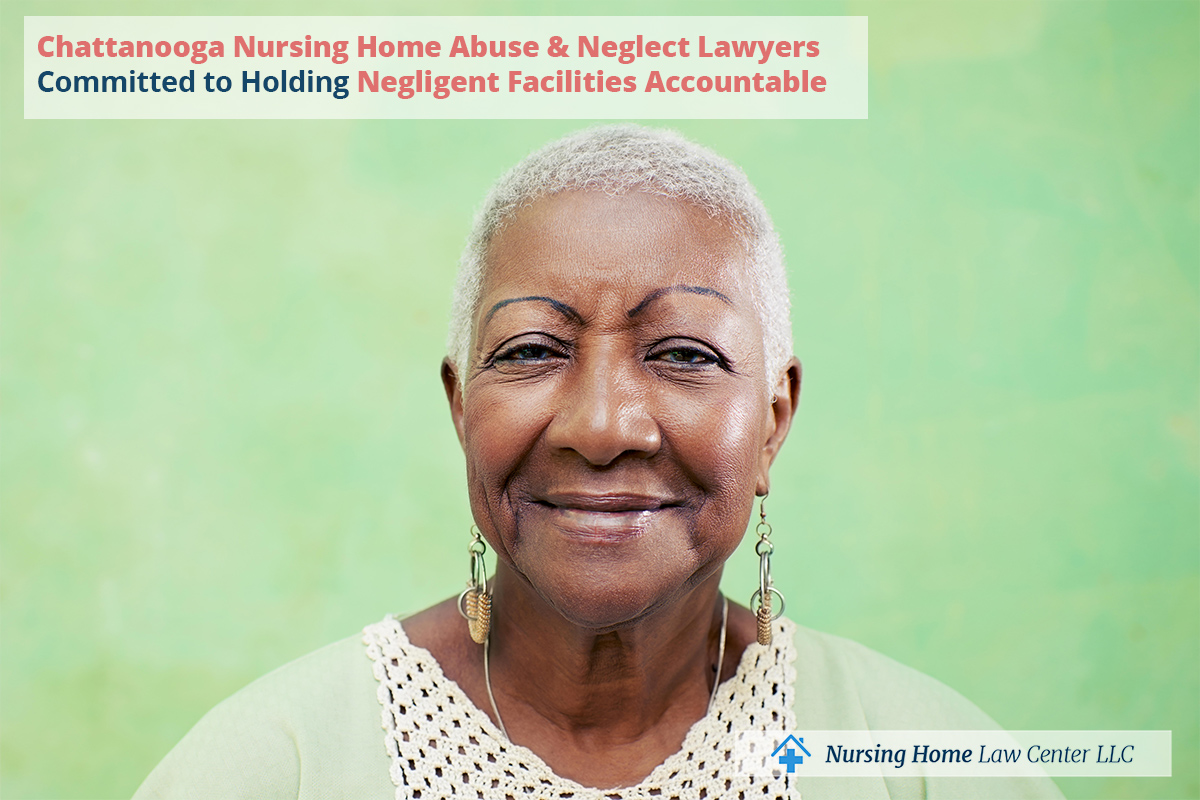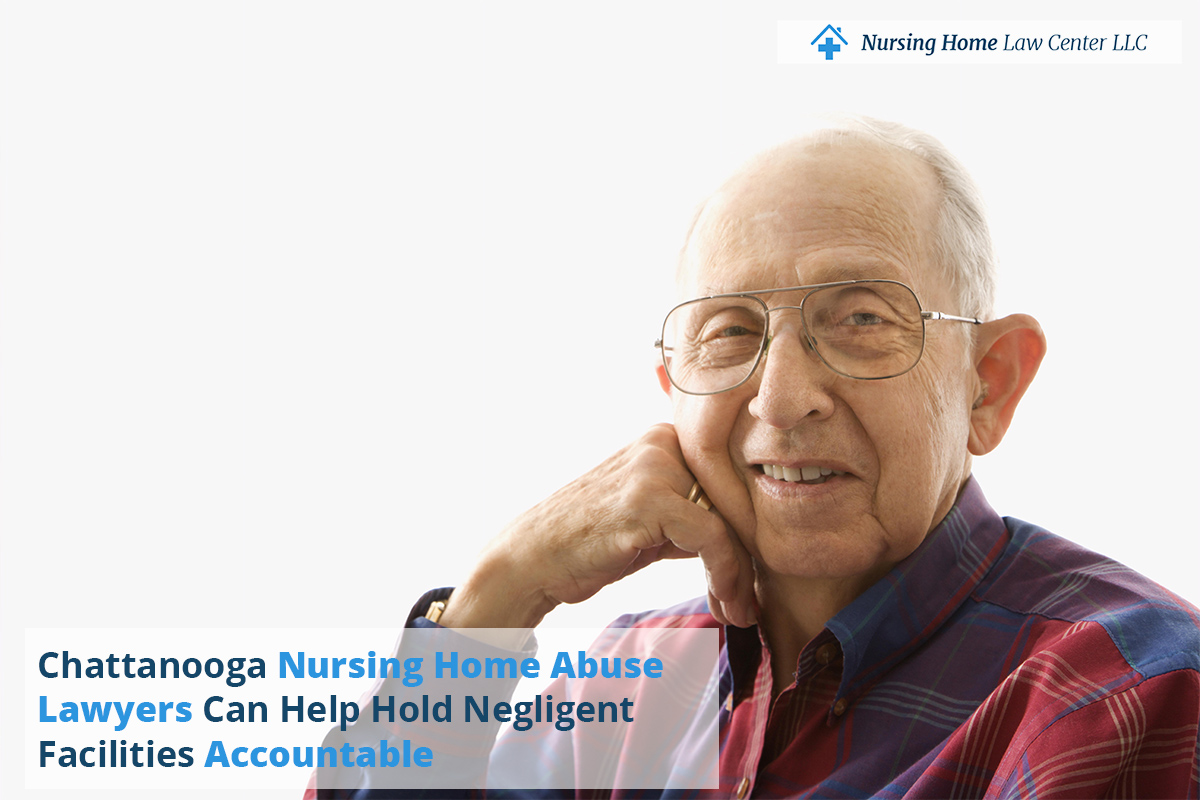legal resources necessary to hold negligent facilities accountable.
Nursing Home Abuse Lawyer Chattanooga
 Nursing home abuse, often hidden and underreported, poses a significant threat to the dignity and safety of the elderly. The impact of such abuse extends beyond immediate harm, leading to long-term psychological and health complications.
Nursing home abuse, often hidden and underreported, poses a significant threat to the dignity and safety of the elderly. The impact of such abuse extends beyond immediate harm, leading to long-term psychological and health complications.
Nursing Home Law Center, LLC is committed to bringing these hidden cases to light. Our nursing home abuse lawyers in Chattanooga offer expert legal representation, aiming to secure justice for victims and implement stricter safeguards against future incidents of abuse.
Protecting the Rights of Elderly Residents in ChattanoogaNursing home residents' rights and welfare are paramount. As dedicated Chattanooga nursing home abuse lawyers, we are committed to protecting these vulnerable individuals from nursing home neglect and abuse. Our experienced attorneys understand the trust placed in nursing facilities and the devastating impact of broken trust.
Our firm's approach to Chattanooga nursing home neglect and abuse cases is rooted in a deep understanding of the emotional and physical trauma suffered by victims. We recognize that elder mistreatment is not just a legal issue but a violation of human dignity.
The role of a nursing home abuse lawyer is critical in safeguarding the rights of the elderly family member. We work tirelessly to hold nursing homes and staff members accountable for their actions, ensuring our clients receive the justice and compensation they deserve. Our firm is a staunch advocate for every elderly person, standing as a bulwark against nursing home neglect and abuse.
Chattanooga Nursing Facility Ratings: a Cause for ConcernRecent Centers for Medicare and Medicaid Services (CMS) statistics reveal a troubling situation in Chattanooga, Tennessee. As of December 2023, an alarming six (30%) of the 20 nursing homes in the area are rated as "below average" or "much below average." This revelation raises significant concerns about senior citizens' safety in these facilities.
 Understanding Elder Mistreatment
Understanding Elder MistreatmentAbusive behavior takes various forms, each with its own set of challenges and consequences. Our experienced attorneys are well-versed in identifying and addressing these different types of elder abuse, including:
- Physical Abuse: Including instances of harm such as hitting, pushing, or inappropriate use of restraints.
- Emotional Abuse: Impacting the mental health of residents through verbal insults, intimidation, or isolation.
- Sexual Abuse: Involving non-consensual acts that can deeply traumatize victims.
- Financial Abuse: Entailing the illegal or unauthorized use of an elderly person's finances or assets.
- Neglect: Manifesting through failure to provide basic needs like food (malnutrition), medication, or proper medical care (medical malpractice).
 Recognizing the Signs of Abuse
Recognizing the Signs of AbuseRecognizing the signs of nursing home abuse is critical for early intervention and protection of residents. Our Chattanooga law firm educates families on identifying these signs to take timely action against potential abuse.
Physical and Emotional IndicatorsIndicators of nursing home abuse can be physical or emotional. Physical signs may include unexplained injuries, pressure ulcers, broken bones, lack of appetite, change in sleep patterns, or poor personal hygiene. Emotional signs often manifest as emotional withdrawal, depression, sudden changes in behavior, or fearfulness around certain nursing staff members.
Financial Exploitation and Nursing Home NegligenceFinancial abuse and neglect are less visible but equally harmful forms of abuse. Signs include sudden financial situation changes, unexplained cash withdrawals or noticeable lack of personal care, and deteriorating health and hygiene declines. Recognizing these signs is key to protecting nursing home residents' financial and physical well-being.
Legal Protections for Nursing Facility ResidentsNursing home residents in Chattanooga are protected under various federal and state laws. These include the Tennessee Health Care Act, which sets standards for resident care and outlines the responsibilities of nursing facilities. Our attorneys are experts in navigating these laws to protect our clients' rights.
Statute of LimitationsThe statute of limitations for filing nursing home abuse claims in Tennessee is an important consideration in legal proceedings. Our attorneys guide clients through the legal process, ensuring that claims are filed within the required time frame to seek justice and compensation.
 How to Respond to Suspected Abuse
How to Respond to Suspected AbuseDo you suspect nursing home abuse? If so, an immediate and appropriate response is crucial. Our Chattanooga law firm can guide you on effectively addressing suspected abuse cases.
Reporting suspected abuse is the first step in protecting residents. We advise how to document abuse effectively, including working with various agencies including:
- Local authorities: To report abuse or neglect within caregiver homes, contact your local law enforcement agency or police department. They can initiate investigations when necessary.
- Tennessee Department of Health: Responsible for overseeing healthcare facilities, including caregiving homes, the Tennessee Department of Health is equipped to receive reports of abuse or concerns regarding the quality of care. They play a significant role in regulating healthcare standards.
- Tennessee Long-Term Care Ombudsman Program: Dedicated to safeguarding the rights and health of residents in long-term care facilities, including nursing care homes, the Ombudsman program is a valuable resource for addressing complaints and ensuring thorough investigations are conducted.
- Tennessee Department of Human Services: In cases involving vulnerable adults, the Department of Human Services can provide crucial support and resources to address instances of abuse or neglect, helping protect those in need.
Prompt reporting is crucial as it not only safeguards the resident's well-being but also helps prevent further instances of abuse. Our law firm specializes in assisting families in navigating the reporting process effectively. We guide you through the appropriate channels to report abuse, ensuring your reports have the maximum impact.
Our goal is for each nursing home abuse attorney to address individual cases and contribute to creating a safer environment for all nursing home residents.
If a family member is in immediate danger, our attorneys provide advice on how to ensure their safety, which may involve relocating them from the abusive environment. We understand the urgency of these situations and assist in taking swift action to protect your loved one.
 Pursuing Justice and Compensation
Pursuing Justice and CompensationSeeking justice for victims of nursing home abuse in Chattanooga is a key focus of our law firm. We are committed to helping abuse victims, and their families navigate the legal process to achieve the compensation they deserve.
Our legal professionals are proficient at deciphering the common signs of mistreatment, which may include bone fractures, unexplained injuries, or a sudden change in an elderly individual's demeanor. Our law firm lawyers are well-versed in the nuances of elder mistreatment cases involving the following:
- Physical abuse
- Sexual abuse
- Emotional or mental abuse
- Financial exploitation
- Nursing home negligence
Having an experienced attorney by your side is critical when confronting cases of abuse in nursing homes. Our nursing home abuse attorneys are trained to handle the sensitive nature of abuse and neglect in care facilities, ensuring that justice is served for the suffering of our elderly loved ones.
They scrutinize the actions of nursing home staff, identifying any failure in duty that could mean a staff member or the institution itself could be held liable.
Types of recoverable damages include:
- Medical expenses
- Pain and suffering
- Other losses due to abuse or neglect
- Punitive damages in cases of egregious misconduct by nursing homes
The impact of abuse or neglect on a family can last a lifetime. Our Nursing Home Law Center, LLC team is here to provide support and legal counsel at no upfront cost, thanks to our contingency fee agreement.
Has your disabled or elderly loved one suffered abuse or neglect by a nursing home staff member or someone in a long-term care facility? Call our nursing facility abuse lawyers at (800) 926-7565 for a free consultation to reclaim your loved one's dignity and rights. Our compassionate Chattanooga nursing home abuse law firm is ready to listen to your concerns, provide legal options, and offer the support and guidance you need.
 Hamilton County Nursing Home Injury Lawyer Nursing Home Law Center LLC Home
Hamilton County Nursing Home Injury Lawyer Nursing Home Law Center LLC Home
